

|
|
|
|
|
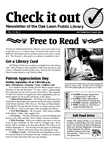
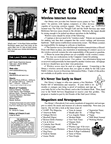
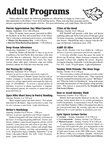
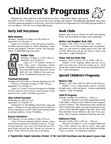
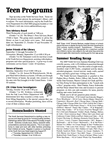
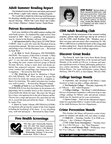
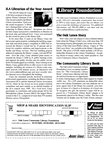
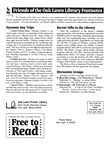
Here is the same
Check
It Out: Newsletter of the Oak Lawn Public Library
, September/October
2005, Vol.19, No.5, in PDF format.
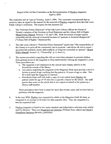
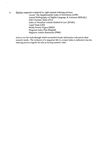
Above
: "
Report of the Ad Hoc
Committee on the Reconsideration of
Playboy
magazine
,"
dated April 6, 2005.
Key phrases
: "The
committee recommends that no action be taken in regard to the request
for the removal of
Playboy
magazine from the Oak Lawn Public Library's
collection. The reasons for this decision are: ... the Library
Bill of Rights...." In the year 2004,
Playboy
was requested
by adults at the Magazine Desk 44 times, as compared to an average of
20 times for other popular titles. Thus, the magazine is a heavily
requested item." [Below see the library director's statement
contradicting this statement.]
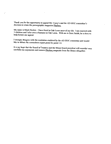
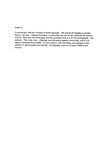
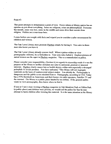
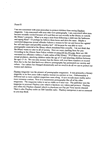
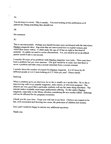
Above
:
Mark Decker's appeal for
reconsideration of the retention of Playboy
, undated.
Key phrases
: "Men ... primarily look at [Playboy]
for the pornography -- the pictures. .... Although your document
opposes censorship, ... we must analyze why something, porngraphy in this
instance is objectionable and harmful. Pornography is proven to
harm children and women." [I]t is not the purpose of the library
to neither stimulate nor cater to antisocial, prurient or immoral interest."
"What is to stop a man from
following a child into the bathroom and raping them
?"
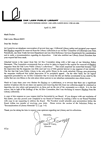
Above
: "
Letter from Director
Casey to Mark Decker
," dated April 12 2005.
Key
phrases
: "[The Committee's recommendation] surprised
me somewhat because I had the impression that the magazine was little
used and was of little general interest to any segment of our clientele.
The fact that Oak Lawn Public Library is the only public library in the
south suburban Chicago area possessing the magazine reinforced that initial
impression of its peripheral appeal."
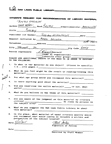
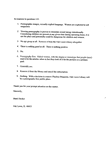
Above
: "
Citizen's Request for
Reconsideration of Library Material, by Mark Decker
,"
dated March 21, 2005.
Key phrases
: "Viewing
pornography is proven to stimulate sexual energy intentionally.
Considering children are present at any given time ..., it is not the
place and potentially could be dangerous for children and women."
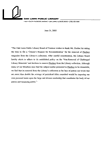
Above
: "
Letter from Board of
Trustees to Mark Decker
," dated July 21, 2005.
Key
phrases
: After careful consideration, the Library Board
hereby elects to adhere to its established policy on the 'Non-Removal
of Challenged Library Materials' and declines to remove
Playboy
....
[P]atron use levels ... are more than double the average ... [and we]
would be imposing our own personal tastes upon ... the taxpaying public."
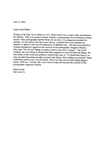
Above
: "
Letter to the Editor
from Mark Decker
," dated June 25, 2005.
Key
phrases
: "Why is everyone in denial, Playboy is pornography
first and literary content second."
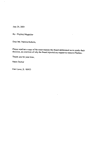
Above
: "
Letter from Mark Decker
to Roberts, Board Pres.
," dated July 20, 2005.
Key
phrases
: None.
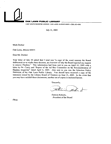
Above
: "
Letter from Roberts,
Board Pres., to Mark Decker
," dated July 21, 2005.
Key phrases
: None.
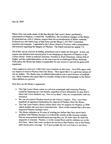
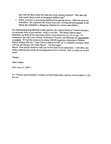
Above
: "
Letter from Mark Decker
to the Mayor of Oak Lawn
," dated July 26, 2005.
Key phrases
: "By implementing and adhering
to their policies, the Library Board of Trustees becomes an autocratic
form of government ...
accountable to nobody
." "Policies
and procedures, Freedom to Read Statements, and non-removal policy is
not the law."
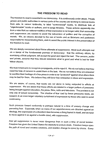
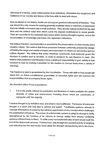
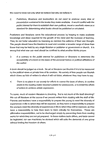
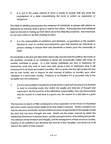
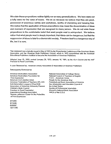
Above
: "
The Freedom to Read
,"
dated October 17, 1995.
Key phrases
: The
whole thing is used as an excuse to push obscenity and makes for eye opening
reading, but never addressed is how stopping the taxpayer funding of obscenity
denies anyone the freedom to go to any corner store and buy the same magazine.
Pushing obscenity totally ignores US v. ALA, 2003, and Board of Education
v. Pico, 1982, both US Supreme Court cases. By the way, the ALA
document was endorsed by the ACLU, the Freedom to Read Foundation, the
People for the American Way, the Sex Information and Education Council
of the United States, etc. Are these the policy makers citizens
want to determine how to spend the citizen's tax money and that the Mayor
should consider autonomous and authoritative?
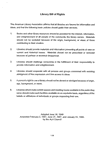
Above
:
So-called "Library Bill
of Rights
," dated January 23, 1996.
Key
phrases
: "A person's right to use a library should
not be denied or abridged because of ... age...."
Inclusion
of "age" reaffirmed January 23, 1996.
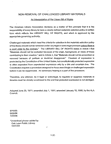
Above
: "
Non-Removal of Challenged
Library Materials
," dated October 21, 2001.
Key
phrases
: The title says is all, but
this is the excuse
used by the library to never remove anything unless forced by a court
of law
. In other words, library policy is to ignore the patrons
but make them jump through hoops that serve only to delay the court opinion.
Of course the library does not want you to know that US Supreme Court
cases such as US v. ALA and Board of Education v. Pico already empowers
citizens to remove certain obscene or pornographic material.
The Mayor
need not fear the library is autonomous -- it is not where it is acting
ultra vires
or outside the law.
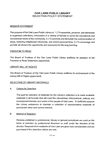
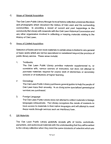
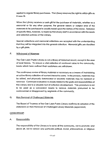
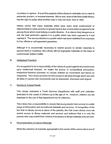
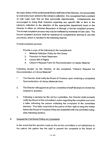
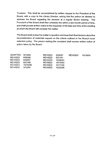
Above
: "
Oak Lawn Public Library
Selection Policy Statement
," dated October 19, 2004.
Key phrases
: "
The purpose of the Oak Lawn
Public Library is ... to serve the educational and recreational needs
of the community...." "It is not the purpose of the Library
to stimulate nor to cater to antisocial, prurient, or immoral interests.
"
"[T]his Library will not segregate materials on the basis of controversial
subject matter." Great, so Playboy is segregated not because it contains
controversial subject matter but because it is obscene.
I see
this and the other statements above as an admission of Playboy's inappropriateness
for inclusion in the public library. I see no reason why the Mayor
can not use the library's own Selection Policy to advocate for the removal
of Playboy.
My local library contains a so-called Access to Electronic Information Policy . The policy is similar to others in many communities and exposes children to the same dangers. The policy is essentially an "anything goes" policy, and it is contrary to fact and law. Here are relevant sections:
The purpose of the Oak Lawn Public Library is: 1. To assemble, preserve, and administer in organized collections, information in a variety of formats to serve the educational and recreational needs of the community; 2. To promote and stimulate the communication of ideas, fostering enlightened citizenship, and enrich personal lives; 3. To encourage and provide all citizens the opportunity and resources for lifelong learning.
The vast majority of information and data obtained via the Library's electronic format is generated outside the Library. Therefore, it is impossible for the Library to guarantee accuracy or to restrict and prevent access to controversial materials in electronic format. The Library assumes no responsibilities for any damages, direct or indirect, or any illegal or criminal activity arising from use of its connection to Internet service. As a public facility, the Library may limit users accessing the Internet through Library owned equipment to World Wide Web sites which are appropriate to the sensibilities of a group setting and which are deemed by Library Staff to fall within the overall standards of our community. The Library is dedicated to protecting and promoting intellectual freedom and will not control or monitor information in electronic format accessed in the Library. The Library may employ software to filter Internet access in the youth Services Department. .... It is the parents' responsibility to monitor their own children's use of the Internet if they wish to ensure that their children view only material they approve.
The policy states out saying things we all want to hear, then completely ignores itself. First it discusses recreational needs, enlightened citizenship, and enrichment of personal lives; lifelong learning is mentioned as an important goal. Then it takes a detour and never gets back on track, making statements that are factually and legally incorrect.
"[I]t is impossible for the Library to ... restrict and prevent access to controversial materials in electronic format." Wrong. It is factually possible with Internet filtering software , and it is legally not only possible, but recommended. As stated in US v. ALA , a US Supreme Court case from 2003, decided against the ALA, "[A] library provides [Internet] access for the same reasons it offers other library resources: to facilitate research, learning, and recreational pursuits by furnishing materials of requisite and appropriate quality. The fact that a library reviews and affirmatively chooses to acquire every book in its collection, but does not review every Web site that it makes available, is not a constitutionally relevant distinction."
"As a public facility, the Library may limit users ... to ... sites ... which are deemed by Library Staff to fall within the overall standards of our community." Well that sounds good, but is is a total sham. ALA policy says, " The applicable statutes and laws, together with the written decisions of courts that have applied them in actual cases, are the only official guides. Libraries and librarians are not in a position to make those decisions for library users or for citizens generally ." Besides, the policy directly contradicts itself: "The Library ... will not control or monitor information in electronic format accessed in the Library." Do you see the problem here? First the policy says staff "may" limit Internet usage in accordance with community standards, then the policy says the staff "will not" limit Internet usage in accordance with community standards.
Note that the library's position as stated in the policy goes against US Supreme Court law. The policy says, "The Library is dedicated to protecting and promoting intellectual freedom and will not control or monitor information in electronic format accessed in the Library." The US Supreme Court in US v. ALA illustrates that this is directly against the weight of the law. "[P]ublic libraries' use of Internet filtering software does not violate their patrons' First Amendment rights...." "Internet access in public libraries is neither a 'traditional' nor a 'designated' public forum." "The interest in protecting young library users from material inappropriate for minors is legitimate, and even compelling, as all Members of the Court appear to agree."
And that last sentence from the Court shows how wrong the existing policy and policies like it can be. The existing policy says, "It is the parents' responsibility to monitor their own children's use of the Internet if they wish to ensure that their children view only material they approve." No, it is everyone's responsibility to keep children from inappropriate material, exactly as the US Supreme Court stated, and on this issue they were unanimous, 9-0.
Tell me, whom shall we follow, the Supreme Court of the United States or local librarians who write policy that is internally inconsistent and evidences an "anything goes" attitude? Worse, local librarians are often guided by the ALA that advises them, among other misdirection, that the case that was overturned by the US Supreme Court was actually the correct decision that people should follow, not the US Supreme Court . Is this what we want in our public library? It is, after all, our public library, not the ALA's branch library in town.
Folks, I realize that saying the ALA sexualizes children is controversial. Sadly, however, that is the truth. For proof, I need only point to the ALA's own statements, of which I will provide a few, but there are so many.
"Push," a 1996 book by Sapphire, is a sexual violent, vulger book entirely inappropriate for children. It includes rape by a father of his daughter and also his granddaughter by his daughter, all three at the same time, where the baby is still in Pampers, until he takes them off, that is. Elsewhere, when the mother/wife catches two in the act, she demands oral sex from her daughter. With all the excellent books available, is this one really necessary for school children? Even the ALA itself admits in Booklist Youth the book is inappropriate for children below the eleventh grade: " Gr. 11 and up. .... A graphic, poignant novel, best suited to mature readers ."
But then the ALA becomes its own worst enemy. Another ALA web site actually highly recommends the book for all ages! Don't blame me for bringing this to your attention, but I think you can see my point that the ALA is pushing this book on children that even the ALA itself says are too young to read this material. On the ALA's "Teen Hoopla" web site appears this :
This book by sapphire is an excellent book for anyone not just teens. Although it does have some vulgar language the book has an overall great storyline and alot of different life lessons. The girl in the book is physically, emotionally, and mentally affected. She has been molested by both her mother and father, and is now bearing her fathers second child. She continues in school while her mother also physically abuses her because she is upset about her husband leaveing her bed to go sleep with thier daughter. The book is great!! crystal p.
Here is further proof of the ALA's sexualization of children, again in the words of the ALA representative. The ALA can be counted on to at least recommend good quality books, right? Wrong. A highly sexualized book is recommended by a top ALA representative even though it is poor quality writing because, hold on to your hats, then the children will know what a good book is when they see it! And this person even writes a series of books on recommended books for children to read! I am not making this up. In the same sentence, another highly sexualized book, this one about teenage oral sex orgies, is recommended because, get the digitalis, then children can get the experience at a safe distance! Would you believe this person who said this was a leader of the youth section of the ALA? What a coincidence! Here is exactly what she said , and check out the attitude at the end of this quote:
The overriding message kids get ... is that "precocious and irresponsible sex" is the norm.
But books can provoke discussions, says Pam Spencer Holley of the American Library Association. Although she wouldn't hand a child a copy of "Rainbow Party" without comment, she thinks that book -- and others -- can provoke family discussions.
"I think I'd say, 'This is something we need to sit and talk about,'" says Holley. "It's a way for kids to experience something at a safe distance -- and a way for them to make up their minds about how they would respond in that kind of situation."
She's happy to see teen girls reading. Eventually, girls who are reading Gossip Girls will move on to better books, she says.
"Unless you read stuff that's perhaps not the most literary, you'll never understand what good works are," says Holley. "But when you get them hooked on reading, then you can lead them so many other places, as far as books go."
Besides, she says, what's the worst thing that can happen? "Nobody complains about the adult women who read Harlequin romances."
There is yet another way the ALA sexualizes children. This time it affects public library and public school library books and Internet access all in a single swoop. This time the ALA's action are purposefully in defiance of the law and common sense.
Common sense says children should not have access to inappropriate material. The Supreme Court of the United States said in US v. ALA, "The interest in protecting young library users from material inappropriate for minors is legitimate, and even compelling, as all Members of the Court appear to agree." And in the context of public school books, the US Supreme Court case from 1982 captioned as Board of Education v. Pico. Justice Harry A. Blackmun wrote that "certainly, the unique environment of the school places substantial limits on the extent to which official decisions may be restrained by First Amendment values. But that environment also makes it particularly important that some limits be imposed."
Along comes the ALA. It has a different view. No, correct that. Before US v. ALA issued it had a view. Now , after being the losing party in US v. ALA, the view had become defiance of the law. Despite the Court's finding that children are entitled to special protection from inappropriate material, the ALA continues to include " age " as a reason not to deny patrons access to any information whatsoever. It is my opinion that when an organization knowingly defies the law and defends its defiance while continuing children's unabated access to inappropriate material in defiance of the law, that constitutes the sexualization of children. True the ALA contends that US v. ALA does not apply where a library does not accept federal funding, but can anyone argue with a straight face that where libraries do not accept federal funding children are not entitled to special protection from inappropriate material?